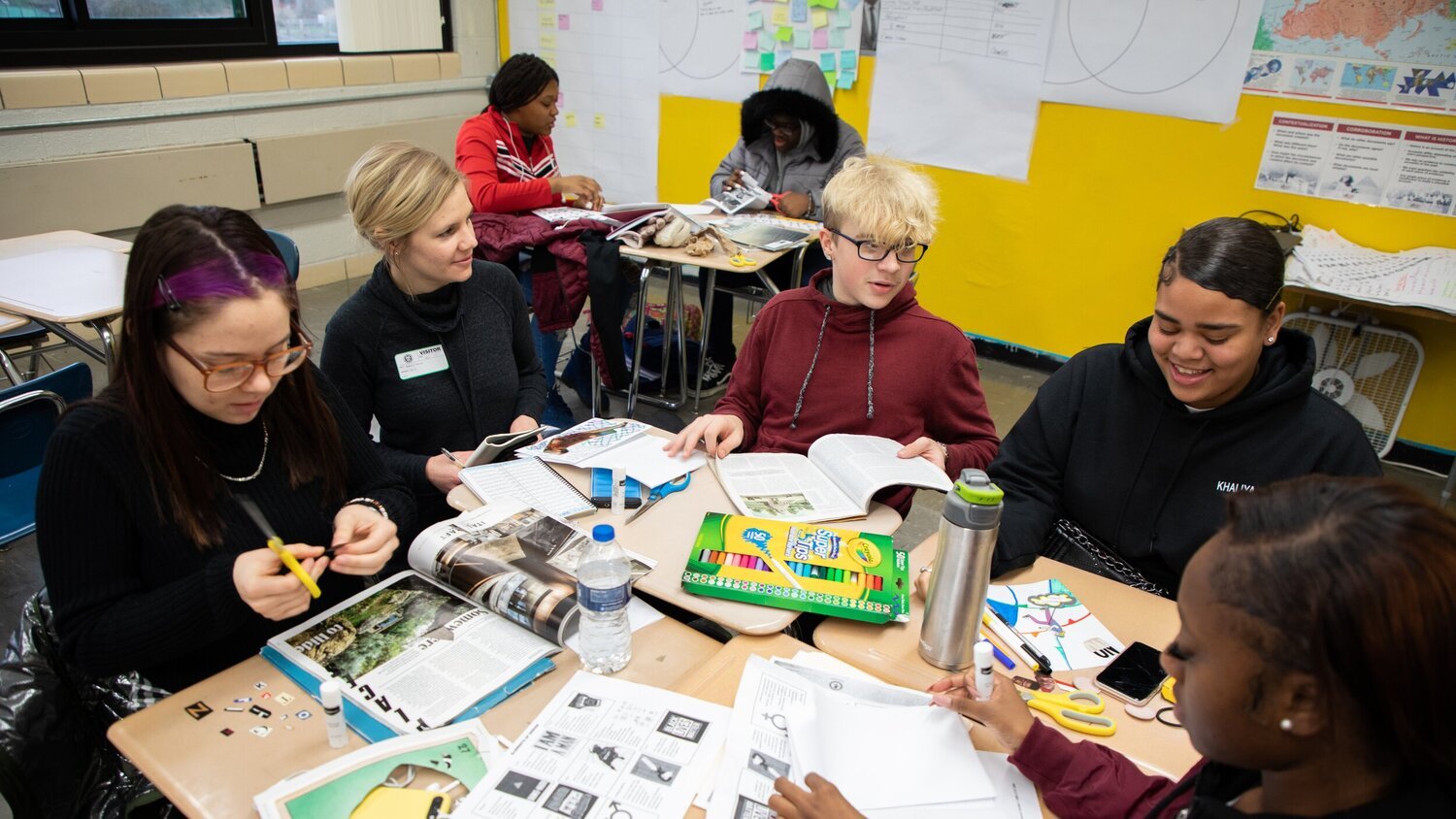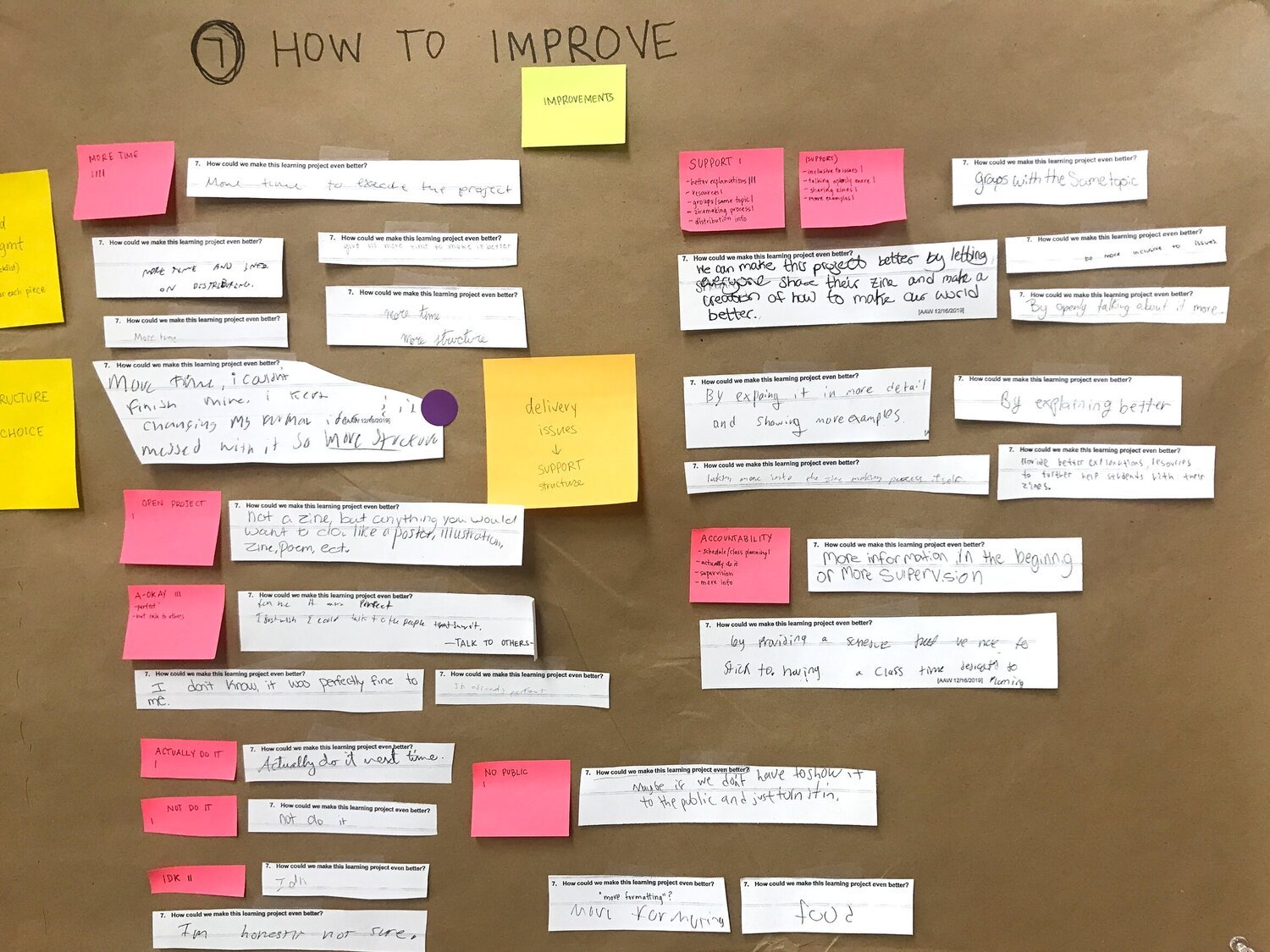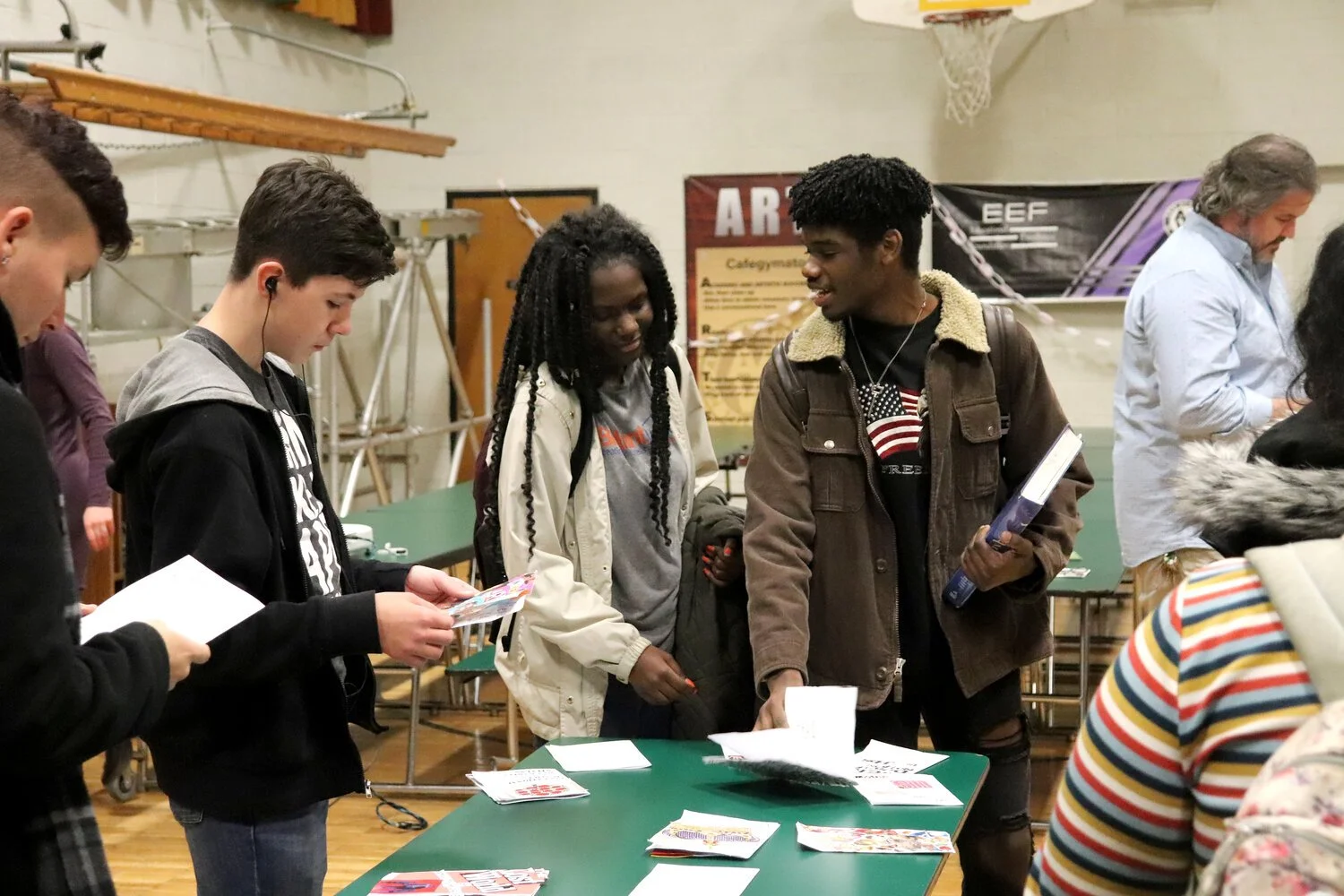
Zine-making as social action:
Integrating design and self-authorship in civic learning
Discover how cross-disciplinary design, research, and collaboration revolutionized a civic education program, empowering students to engage with social justice issues through the creative and accessible medium of zine-making, fostering a culture of self-authorship and active participation.
Client: Equitable Futures
A social justice teaching and learning program for high school students to understand the impact of injustices in their local region and connect historical learnings to their own lived experiences.
Sector: Education
Project Type: Consulting, Capacity Building
Collaborators: Darin Stockdill, PhD; Brandon Moss
Partners: Arts Academy in the Woods and Fordson High School students and teachers (Detroit, MI); University of Michigan's Center for Education Design, Evaluation, and Research (CEDER)
Duration: 15 months
Award: 2020 Jean Paul Slusser Thesis Award
Services:
Qualitative research
Prototyping & testing
Workshop facilitation
Content design & strategy
Project management
Overview
Traditional civic education often overlooks design resources, limiting underrepresented students' ability to see themselves as change agents.
Schools in marginalized communities face constraints like district requirements and lack of design tools, hindering civic knowledge and participation.
This project aimed to empower students through zine-making, supplementing teachers' pedagogy with low-cost, accessible design activities that connect in-school learning to social justice issues.
Guiding Questions:
How might we use zines to empower students to become civic participants who communicate about social justice issues?
How might we supplement teachers’ existing pedagogy with low-cost, accessible design activities that facilitate their students' connection of in-school civic learning to outside interests creatively?
Outcome
This thesis developed, tested, and evaluated a pilot zine-making workshop toolkit that enhances creativity and student voice in civics. This toolkit serves as a supplementary resource to Equitable Futures, enabling students to explore social injustices and connect historical learnings to their experiences.
What does it mean to learn civics? Civics, much like design, aims to transform knowledge, attitudes, and systems of public life. Zines, being powerful and straightforward tools, enable participation in important dialogues that shape policy, influence ideas, and potentially change minds. Therefore, I used zines as a means to explore and bridge the gap in civic education.

Process
Alongside my collaborators, I applied a service design approach through an iterative, participatory process in four phases.
Phase I: Initial Prototypes
Conducted initial zine-making workshops in classrooms and a Youth Forum to test the concept.
High school students from Metro Detroit took part in Equitable Future’s Youth Forum Zine-making Workshop asking “What can we do now to create a more equitable future?” Groups created zine compilations. (Photos courtesy of the University of Michigan’s School of Education)
Phase II: Workshop Development
Co-developed a workshop framework with educators and designers to ensure practical application in classrooms.
Workshop Process. Not only did students learn to make zines, they learned design methods as a way to narrow down their topic of interest, research, and visually communicate about social justice issues.
Phase III: Pilot Workshop
Implemented, tested, and refined the pilot workshop in a civics classroom, gathering detailed feedback. A civics teacher facilitated the activities, while I participated as a researcher using an educational design-based research approach.
Participant observation during the pilot workshop in Mr. Moss’ civic class at Arts Academy in the Woods (AAW).
Phase IV: Evaluation
Analyzed data and artifacts from the pilot workshop using coding, memos, affinity diagramming, and comparative analysis. Collected and assessed quantitative pre- and post-workshop surveys from students and the teacher to evaluate the educational experience and workshop impact.
Analysis of questionnaire responses were printed, cut, and organized via affinity diagramming to make sense through themes and abductive reasoning.
Insights:
Time Constraints
Time was a consistent challenge, often leading to reduced opportunities to work on the project and facilitate classroom discussions. These constraints taught me to embrace the research process and adapt to new developments as they unfolded.Student Expression
Young people are eager to share their thoughts and feelings. When they are not afforded the ability to express themselves, students, especially those who are underrepresented, are effectively silenced. Ensuring student voice throughout the entire design process is crucial.Creative Freedom
The students discovered that the project allowed them creative freedom, enabling them to use their voices and challenge their ability to combine creativity with social science.

Key Outcomes
This thesis project yielded several significant outcomes that demonstrate the effectiveness of integrating design thinking into civic education. These outcomes highlight the practical applications of service design principles in enhancing student engagement and participation in social justice discussions.
Toolkit Development
Created a comprehensive zine-making workshop toolkit, complete with guided activities and materials to facilitate classroom implementation. This toolkit serves as a service design artifact, offering a structured yet flexible framework for educators.Youth-Led Zine Gathering
Established a platform for students to showcase their work and discuss social justice issues, promoting youth-led engagement and dialogue. This initiative highlights the importance of user-centered design by prioritizing student voices and experiences.Cross-Disciplinary Approach
Integrated design thinking into civic education, connecting design and activity theory to enhance students' learning experiences. This approach reflects the principles of service design, emphasizing interdisciplinary collaboration and practical application.Study Approval
Received IRB exempt approval for the study, ensuring ethical standards were met and validating the research process as a rigorous and responsible service design practice.
These outcomes underscore the project's relevance to service design by demonstrating how user-centered, iterative, and interdisciplinary methods can be applied to educational contexts to foster engagement, creativity, and social impact.
The zine-making workshop occurred over eight weeks, complete with a “Teen Zine Showcase” organized by students at Arts Academy in the Woods to share their zines with the public.
Impact
The workshop has continued to be used in Mr. Moss' classroom, and he has successfully adapted it for virtual teaching. I had the honor of joining as a guest when students presented their zines, witnessing firsthand the ongoing impact and engagement this project fosters.
Additionally, this workshop is now embedded in the Equitable Futures program and has become a collective activity at their annual Youth Forum, where students create a zine together. It is also an option for the Mikva Challenge's "Project Soapbox," a public speaking program that calls young people to speak out on issues that affect them and their communities.
“To understand the current crisis of education and project a better future for our children, we need to begin thinking about how our culture is shaped by the means through which we communicate: the spoken word, the printed word, and the images of the electronic media.”
— Grace Lee Boggs, 2012









